
 NYC Housing Authority311
NYC Housing Authority311 Search all NYC.gov websites
Search all NYC.gov websites
NYCHA Sustainability Agenda: 2017 Progress Report
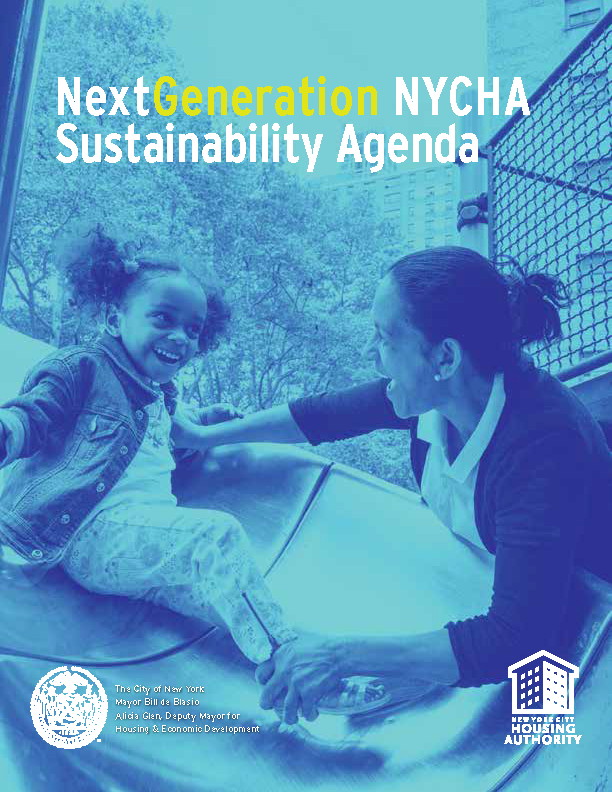
NYCHA’s Sustainability Agenda, released on Earth Day 2016, is both a roadmap for the next 10 years and an invitation to residents, housing and environmental advocates, community-based organizations, sister agencies, and educational institutions to work together to create a sustainable and resilient city.
The Sustainability Agenda is guided by four principles:
- Make resident quality of life the top priority and key measure of success;
- Adopt rigorous evidence-based practices;
- Communicate goals, metrics, and methods clearly and transparently;
- Work in a spirit of partnership.
| Goal 1: Achieve short-term financial stability and diversify funding for the long term | |
|---|---|
|
Strategy S1: Attract investments for capital improvements |
NYCHA is well on the way toward its goal of obtaining $300 million via HUD Energy Performance Contracts (EPCs). Two EPCs totaling $150 million have been submitted to HUD for approval, and two more are on track to be submitted this year. And since Earth Day 2016 NYCHA has secured:
|
|
Strategy S2: Raise revenues through clean and distributed energy projects |
NYCHA recently received a grant of $3.2 million from NYSERDA for Combined Heat and Power installations at up to 6 developments; the sites will be selected shortly. This fall, NYCHA will invite solar developers to propose photovoltaic installations on NYCHA property in exchange for lease payments. This RFP will be the first of an anticipated series to meet the Renew300 commitment of 25 MW over 10 years. |
| Goal 2: Operate as an effective and efficient landlord | |
|---|---|
|
Strategy S3: Create healthy indoor environments |
Implement a Comprehensive Mold Response Initiative: NYCHA has launched Mold Busters, a pilot program that trains NYCHA staff to find the root causes of mold and eliminate them. The pilot will run from May 1, 2017 to April 30, 2018 and will include 38 developments in Brooklyn, Manhattan, Queens, and the Bronx. Results will be evaluated by a Columbia University researcher. Require low- and no-VOC caulks, paints, coatings, and adhesives: NYCHA has updated the Design Guidelines for the Rehabilitation of NYCHA Residential Buildings to require low-and no-volatile organic compound (VOC) caulks, paints, primers, coatings, and adhesives for all capital projects in apartment interiors. Reduce exposure to secondhand smoke at home: NYCHA has launched an initiative to educate residents about the health risks of exposure to secondhand smoke and has expanded access to services for smokers who want to quit. NYCHA sought feedback and ideas on smoking and health from residents in every borough and will adopt a smoke-free housing policy in 2018 to comply with HUD rules. Train property managers in practices that promote healthy homes: In summer 2016, the Urban Green Council Sustainability Boot Camp provided “GPro” energy-efficiency training to almost 200 NYCHA staff members. The program was a joint effort of The Mayor’s Office of Sustainability, REBNY, BOMA NY, Urban Green Council, and the Mayor’s Fund to Advance New York City. |
|
Strategy S4: Efficiently provide comfortable and reliable heat and hot water |
Improve heating and hot water systems through smart building technology: In April CUNY’s Building Performance Lab will submit a report recommending upgrades of NYCHA’s heating controls. Meanwhile, NYCHA has continued to expand the use of indoor temperature sensors. About 4 percent of buildings that can benefit from the technology currently have the sensors; 28 percent are expected to have them by 2019. Thoroughly test and tune all building systems regularly: NYC DOB has approved NYCHA’s alternative compliance plan for Local Law 87 retro-commissioning that would enable all buildings covered by the law to file by 2020. NYCHA is also working to include retro-commissioning in regular inspections. Enhance training and professional development for Heating Management staff: This Spring the Building Performance Lab is designing a training program for Heating Management staff that would provide a multi-year professional development path. |
|
Strategy S5: Improve water management |
Install water meters in all developments: DEP has started the installation of 540 meters at 500 NYCHA buildings. All NYCHA buildings will have meters in place by 2019. Understand the patterns of water consumption: NYCHA and DEP are partnering on a NYSERDA-funded a water consumption study that will take place during 2018-2019 at South Jamaica Houses. The study will coincide with EPC-funded energy upgrades and a DEP green infrastructure installation. Replace outdated fixtures and update purchasing standards: NYCHA has now updated its purchasing standards to match the NYC affordable housing standard for toilets (1.28 gallons per flush), showerheads (1.5 gallons per minute), and bathroom faucets (1 gallon per minute). In addition, NYCHA worked closely with HUD to develop a way to include water conservation improvements, including ultra-high efficiency toilets in our EPCs. NYCHA has been testing ultra-high efficiency toilets (0.8 gpf vs. 1.6 gpf for standard toilets) in 14 apartments since 2016. Another 84 test toilets will be installed in the next four months. |
|
Strategy S6: Adopt a comprehensive waste management plan |
Install recycling infrastructure throughout NYCHA’s portfolio: In 2016, NYCHA completed the installation of 1,500 recycling bins. All NYCHA developments now have recycling infrastructure. Complete a waste characterization study by 2017: NYCHA has convened an inter-agency advisory group to oversee the waste characterization study. The study will be conducted this summer, with results available by year-end. |
Highlight of Goal 2
NYCHA installs 1,500 recycling bins in less than 2 years
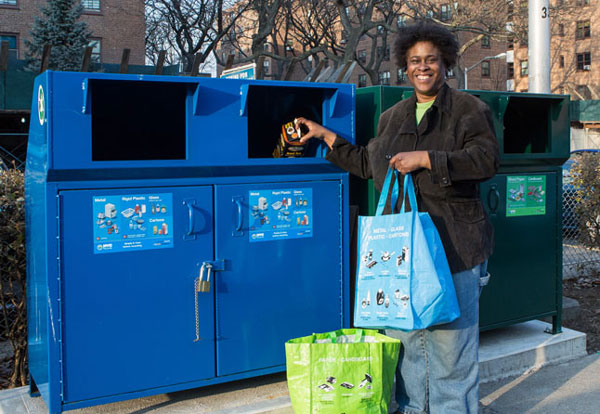
Pomonok Houses resident Pamela Azore is an Environmental Ambassador for the NYCHA Recycles! Program.
NYCHA installed recycling bins in every NYCHA development in only 22 months. The 1,500 bins make it possible for more than 400,000 residents to recycle paper, glass, metal, and plastic.
With the help of the NYC Department of Sanitation and GrowNYC, NYCHA trained 1,400 employees and nearly 12,000 residents about the recycling process. To spread the word about recycling to their neighbors, more than 60 residents have been trained as volunteer Environmental Ambassadors.
Recycling at NYCHA is a big part of Mayor Bill de Blasio’s “Zero Waste” initiative, which calls for the reduction of the city’s solid waste by 90 percent by 2030.
| Goal 3: Rebuild, expand, and preserve public and affordable housing | |
|---|---|
|
Strategy S7: Adopt sustainability standards |
In April 2016, NYCHA adopted the New York City Overlay to the Enterprise Green Communities Criteria as the green standard for new construction. The Criteria provided the foundation for the Design Guidelines for Rehabilitation of NYCHA Residential Buildings released last December. |
|
Strategy S8: Eliminate roof, façade, and plumbing leaks |
In January 2017, Mayor de Blasio announced that the City will invest $1 Billion to replace roofs at more than 700 NYCHA buildings |
|
Strategy S9: Retrofit master-planned developments |
As noted above in Goal 1 Strategy S1, a $56 million EPC for 16 developments was approved by HUD in December 2016 and started lighting installations in April. A $16 million lighting installation in Brooklyn, part of a $94 million, 19-development EPC currently under HUD review, will be completed in May. NYCHA plans to submit two more EPCs for HUD approval later this year. |
|
Strategy S10: Retrofit scattered-site developments |
Sunset Park Redevelopment Corporation (SPRC), a NY State Weatherization (WAP) agency, completed energy efficiency upgrades at Howard Avenue Houses this past March. This was the first time in the 40 year history of WAP that NYCHA buildings have benefitted from the program. SPRC will begin upgrades at Belmont-Sutter Houses in May. Six additional WAP agencies are currently conducting energy audits of 18 developments comprising 2,238 apartments. |
|
Strategy S11: Build green infrastructure |
DEP expects to complete the green infrastructure (GI) installation at Edenwald Houses, the largest GI installation in the city, by end of 2017. Additional developments are under assessment. |
|
Strategy S12: Incorporate climate change resiliency into capital planning |
Enterprise Community Partners, an affordable housing non-profit, and DNV GL, a technical consultancy, will soon conduct resiliency studies at NYCHA developments. Beginning in May, the Enterprise Building Resilience Assessment Program (BRAP) will asses the resilience of 12 NYCHA buildings and recommend ways to protect the buildings from extreme weather and disruption. DNV GL will make similar assessments on 10 NYCHA buildings. Their report, which is expected to be available by the end of 2018, will also address environmental justice issues and the social impacts of extreme weather. |
Highlights of Goal 3
NYCHA begins the largest public housing energy-efficiency project in the nation
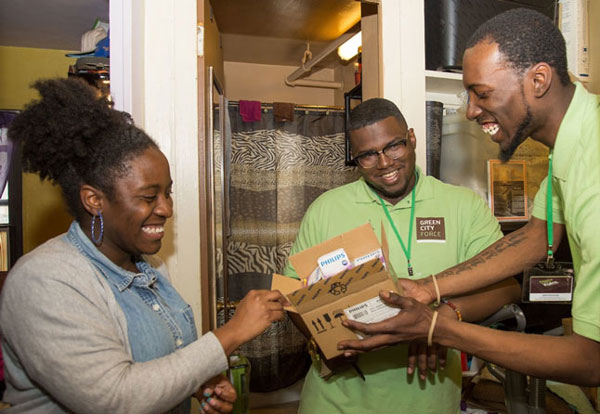
Green City Force (GCF) corps members deliver efficient light bulbs to a tenant at Clason Point Houses in the Bronx. GCF trains young NYCHA residents for green jobs.
This spring NYCHA began to improve energy efficiency at 34 developments as part of the first phase of a program announced in 2015. All 34 developments will receive more-efficient LED (light-emitting diode) bulbs and fixtures. Since the initial announcement, the program has grown to $300 million (from an original $100 million), and is now slated to serve 120,000 homes -- two-thirds of all NYCHA apartments.
Common area and apartment lighting retrofits began in March at 18 Brooklyn developments, funded by a loan from the New York State Green Bank. Lighting and water retrofits began in April at 16 other sites. This work will also include comprehensive heating upgrades, including boiler room replacement, at Whitman Houses in Brooklyn.
New stormwater-friendly walkways and plazas also deliver cleaner waterways
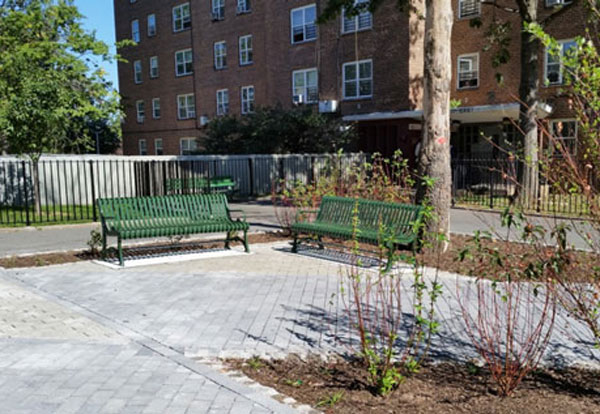
Permeable pavers at Edenwald Houses allow rainwater to filter into the ground rather than run off and overwhelm the sewer system.
Green infrastructure, such as rain gardens, underground detention, and porous pavement, helps improve local drainage while beautifying grounds and preventing the release of pollution into nearby waterways.
The first of two phases at Edenwald Houses in the Bronx is nearly complete. The Department of Environmental Protection's $10.6 million project will capture approximately 10 million gallons of stormwater each year, easing pressure on the sewer system and decreasing overflows during rainstorms. The second phase of the project will be finished late this year.
| Goal 4: Engage residents and connect them to best-in-class services | |
|---|---|
|
Strategy S13: Support resident- and community-led sustainability |
Promote healthy food access through resident-led urban agriculture: Farms at NYCHA was launched in 2016 and built three new farms to expand healthy food access, provide youth workforce and leadership development, and promote sustainable and connected public housing communities. The program teaches young public housing residents how to build and maintain farms that serve fellow residents. Last year the program’s four farms harvested 12,400 pounds of fresh produce, and residents contributed more than 3,000 pounds of food scraps for composting. |
|
Strategy S14: Connect residents to green jobs |
NYCHA employed 28 residents to work on energy efficiency projects. As NYCHA begins construction on more of these projects, we expect to hire more than 50 residents through Section 3 by 2019. In partnership with The Department of Sanitation’s Bureau of Recycling and Sustainability, the NYCHA Resident Training Academy (NRTA) trained 148 janitorial trainees on NYCHA’s new recycling initiatives. In addition to a 6-hour recycling workshop, the training included a half day visit to the Sunset Park Materials Recovery Facility operated by Sims. |
Highlights of Goal 4
Resident Green Committees awarded $10,000
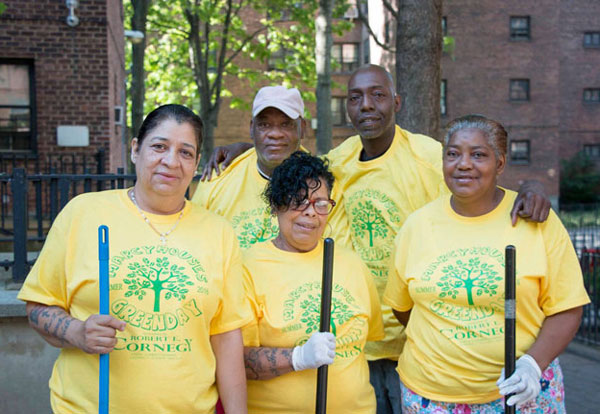
In 2016, five Resident Green Committees (RGCs) received grants and resources to support sustainability projects. Four developments (Pomonok, Ingersoll, Beach 41st Street and Ravenswood) received grants from the Citizens Committee of NYC. The Lower East Side RGC was awarded $2,200 by the NY City Council to rehabilitate several gardens.
Started in 2010, the RGC program provides a platform for NYCHA residents to adopt and promote a healthier, cleaner, and more energy-efficient lifestyle. The 15 active committees held the second annual RGC Summit June 2016, which drew more than 100 participants for a 1-day conference on sustainability.
NYCHA receives $1,000,000 as its first-ever Weatherization grant

Howard Avenue Houses in Brownsville, Brooklyn is the first NYCHA development ever to receive energy efficiency upgrades under the New York State Weatherization Assistance Program (WAP).
The WAP grant, supplemented by a NYCHA contribution, funded new lighting throughout the apartments and common areas, new boilers, new windows, new ventilation fans, and air barriers for through-wall AC sleeves.
A 2-year collaboration among HUD, the NYS Department of Homes and Community Renewal (HCR), and NYCHA has pre-qualified an 8,000-apartment pipeline for future WAP projects. The next development to begin construction, in May, will be Belmont Sutter Houses, also in Brownsville. NYCHA hopes to be able to tap up to $30 million in WAP upgrades for small buildings by 2025.
Farms at NYCHA builds new urban farms at three NYCHA developments
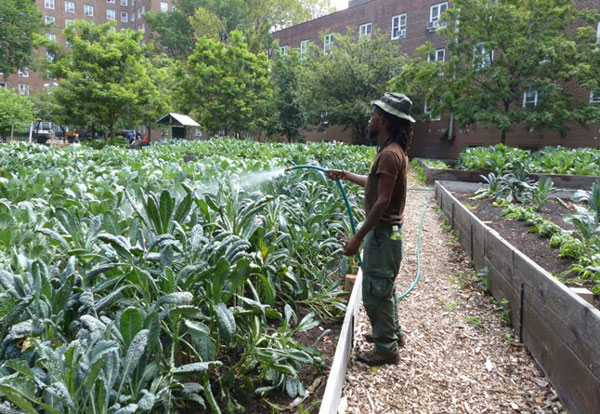
Green City Force Team Leader Andrew Lewis cultivates fresh produce at the Red Hook Houses farm.
Farms at NYCHA was launched in 2016 to expand healthy food access, provide youth workforce and leadership development, and promote sustainable public housing communities. The farms are constructed and operated by 18- to 24-year-old NYCHA residents who are Green City Force (GCF) AmeriCorps Members. GCF deployed two teams of resident leaders to build, cultivate, and lead community programming at the three farms built last year.
The program creates a new model for urban farming grounded in sustainable, local leadership, and was recently recognized as a 2017 AmeriCorps Project of the Year. Two more farms, one each in Staten Island and the Bronx, are planned for this year.
Farms at NYCHA is part of Building Healthy Communities (BHC), a city-wide partnership focused on improving health in 12 neighborhoods throughout the city.
| Working towards 80 x 50 | |
|---|---|
|
Strategy S15: Create an 80 x 50 roadmap |
In 2016, NYCHA, as part of the HUD Better Buildings Challenge, committed to reduce its energy use per square foot by 20 percent by 2026. NYCHA also joined the NYC Carbon Challenge to reduce GHG emissions 30 percent by 2027. NYCHA has engaged Steven Winter Associates, who have provided similar technical assistance to the Mayor’s Office of Sustainability, to help develop a long-term energy strategy that takes NYCHA’s capital planning process and constraints into account. |
|
Strategy S16: Create incentives to encourage new low-energy buildings |
In May 2017, Enterprise Community Partners will provide an introduction to Passive House specifications to developers who have qualified to submit development proposals to NYCHA.
|
|
Strategy S17: Test “deep” energy retrofit technologies |
In order to test new technologies, NYCHA and the Mayor’s Office of Technology Innovation (MOTI) conducted the first two Calls for Innovations, which requested proposals to reduce in-apartment electricity consumption and improve efficiency of heating and hot water systems that use ConEd district steam. Three proposers were selected to conduct pilot installations in 2017-2018. |
Highlight of Working towards 80 x 50
NYCHA, NYC’s largest housing owner, pledges to reduce its carbon footprint by 30%

NYCHA pledged to voluntarily reduce its buildings’ greenhouse gas emissions by 30 percent over the next 10 years as part of the NYC Carbon Challenge for Multifamily Buildings.
NYCHA, the largest organization to make the pledge, joins 20 of the city’s leading residential property management firms, owners, and developers. The Carbon Challenge encourages the city’s largest organizations to cut greenhouse gas emissions, improve air quality, and reduce the impact of climate change.


